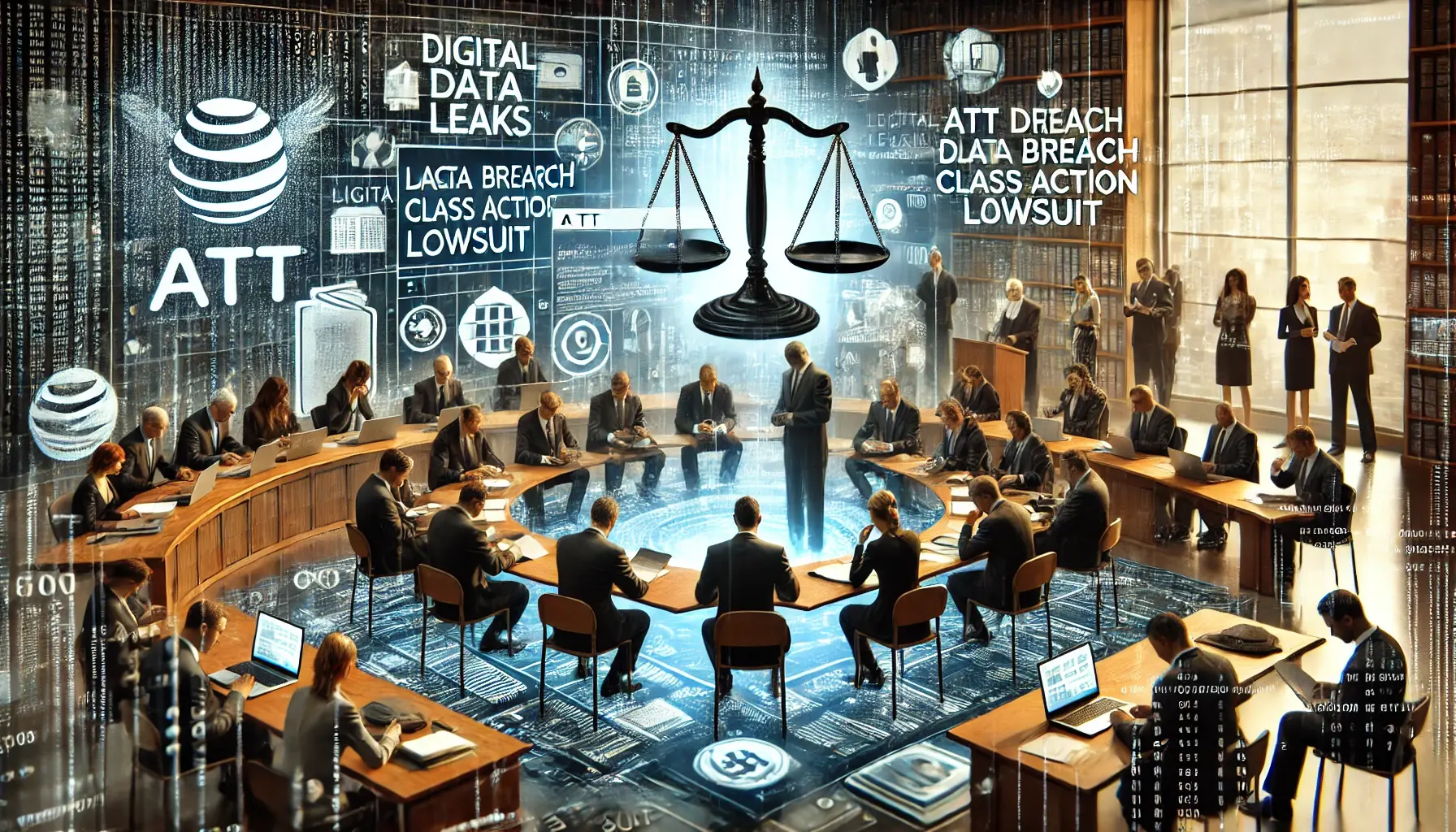Introduction ATT Data Breach Class Action Lawsuit
The ATT data breach has raised serious concerns among its millions of customers. This breach involved the unauthorized access of personal information, including phone records, social security numbers, and account PINs. As a result, many customers feel their privacy and security are at risk. In response to this, a class action lawsuit has been filed against ATT. This lawsuit claims that ATT failed to protect customer data properly and was negligent in its security practices. This article will explore the key details of the AT&T data breach and the lawsuit that followed.
Brief Overview Of The AT&T Data Breach
The AT&T data breach is a major incident affecting millions of its customers. Reports indicate that between 51 million and 109 million individuals had their data exposed. The stolen data included sensitive details such as usernames, social security numbers, email addresses, and account PINs. The breach was first reported in early 2024, but there are indications that the data was compromised long before that. Initially, AT&T denied the involvement of their data in the leak. However, after further investigation, the company admitted that the breached information belonged to its customers.
The scale of the AT&T data breach is vast, leaving millions of people vulnerable to risks like identity theft and financial fraud. Hackers can use the stolen information to create new accounts, take out loans, or perform other illegal actions using the names of those affected. AT&T’s delayed acknowledgment of the breach has also led to frustration and concern among its customers, who expected more immediate and transparent communication.
Introduction Of The Class Action Lawsuit Filed Against AT&T
Following the AT&T data breach, a class action lawsuit was filed against the company. The lawsuit alleges that AT&T failed to implement sufficient security measures to protect customer information. According to the lawsuit, AT&T was negligent, allowing hackers to easily access and steal personal data. The plaintiffs in the lawsuit argue that AT&T did not notify customers about the breach in a timely manner, which left them at risk for an extended period without their knowledge.
The class action lawsuit seeks compensatory damages for those affected by the AT&T data breach. It also demands that AT&T take immediate steps to improve its security protocols to prevent such incidents from happening again. The lawsuit underscores the need for large companies like AT&T to prioritize the security of customer data and act swiftly when breaches occur.
Background Of The AT&T Data Breach
The AT&T data breach is one of the largest cybersecurity incidents in recent history, affecting millions of its customers. The breach involved the unauthorized access of sensitive customer information, raising significant concerns about data privacy and security.
Timeline Of Events: When And How The Breach Occurred
The breach was initially discovered in early 2024 when reports surfaced that hackers had accessed sensitive data from AT&T’s systems. However, investigations revealed that the breach had likely started much earlier, possibly as far back as 2019. During this time, unauthorized parties gained access to a vast amount of personal data, including usernames, social security numbers, email addresses, and account PINs. AT&T initially denied the breach, stating that the leaked data did not originate from their systems. However, after further scrutiny and pressure from cybersecurity experts and affected customers, AT&T eventually acknowledged that the data was indeed linked to its customers.
Details On The Data Exposed
The data breach exposed a wide range of sensitive information, putting millions of AT&T customers at risk. The compromised data included:
- Phone Records: Call logs that detail who customers contacted and the duration of these calls.
- Social Security Numbers: Highly sensitive personal identifiers that can be used in identity theft and other fraudulent activities.
- Account PINs: These are used for securing customer accounts, allowing unauthorized parties to make changes to account settings.
The exposed data was later found on various illegal platforms on the dark web, making it accessible to cybercriminals worldwide. This availability significantly increased the risk of identity theft, financial fraud, and other malicious activities targeting the affected individuals.
Discrepancies In The Reported Number Of Affected Customers
There have been conflicting reports on the exact number of affected AT&T customers. Some sources reported that the breach impacted approximately 51 million customers, while others suggested that the number could be as high as 109 million. This discrepancy in numbers can be attributed to differences in reporting from various sources, as well as the evolving nature of the investigation. Some reports indicate that AT&T initially underestimated the extent of the breach, and as more data came to light, the estimates of affected individuals grew significantly.
The wide range of affected customers reflects the complex and large-scale nature of the data breach. This inconsistency has also fueled customer frustration, as many individuals remain unsure if their data was compromised in the incident. AT&T’s acknowledgment of the breach and the subsequent class action lawsuit underscore the need for transparency and stronger data protection measures in the face of such significant security failures.
Legal Actions And Allegations
Overview Of The Class Action Lawsuit Filed By Affected Customers
In response to the AT&T data breach, a class action lawsuit was filed by affected customers who claimed that AT&T failed to adequately protect their personal information. The lawsuit aims to represent all individuals whose data was exposed in the breach, accusing AT&T of neglecting its responsibility to safeguard customer information. This legal action is one of the most significant repercussions of the data breach, as it seeks to hold AT&T accountable for its security failures and to provide compensation to the victims.
Allegations Against AT&T
The class action lawsuit against AT&T includes several serious allegations:
- Negligence: The lawsuit alleges that AT&T was negligent in protecting sensitive customer data, allowing unauthorized access that could have been prevented with proper security measures.
- Failure to Secure Data: It is claimed that AT&T did not take the necessary steps to secure personal information, making it vulnerable to hackers. The breach exposed millions of records, including social security numbers and account PINs, which are critical for personal security.
- Delayed Disclosure of the Breach: Another major allegation is that AT&T delayed informing its customers about the breach. This delay potentially increased the risk of identity theft and other fraudulent activities, as affected individuals were not immediately aware of the compromise of their data.
- Breach of Implied Contract: The lawsuit also argues that AT&T breached its implied contract with customers by failing to protect their personal information, which was a fundamental expectation of the service provided.
Specific Law Firms Involved In The Lawsuits
One of the prominent law firms leading the legal action against AT&T is Morgan & Morgan. This firm, known for handling large-scale consumer protection cases, is seeking compensatory damages for affected customers. They also demand that AT&T implement stronger data security protocols to prevent similar breaches in the future. Morgan & Morgan’s involvement highlights the seriousness of the allegations against AT&T and the widespread impact of the data breach on millions of customers.
Impact On AT&T Customers
Description Of The Risks Faced By Customers
The AT&T data breach has exposed millions of customers to significant risks. The most immediate concern is identity theft, as the stolen data includes sensitive information that can be used to impersonate individuals. This can lead to fraudulent financial activities, such as opening new credit accounts or taking out loans in the names of affected customers. Additionally, the exposure of account PINs puts customers at risk of unauthorized changes to their AT&T accounts, further compromising their security.
Beyond identity theft, the breach also opens the door to other forms of cybercrimes. With access to detailed phone records, cybercriminals could engage in targeted phishing attacks or other schemes aimed at extracting more personal information from the victims. The impact of these risks extends beyond financial loss, as they can also cause emotional distress and long-term damage to the victims’ credit and reputation.
AT&T’s Response Measures
In response to the breach, AT&T has taken several measures to mitigate the impact on affected customers. These measures include:
- Resetting Account PINs: AT&T reset account PINs for customers whose data was compromised to prevent unauthorized access and changes to their accounts.
- Offering Free Identity Theft Protection: AT&T has offered affected customers a year of free identity theft protection services to help monitor their personal information and detect any fraudulent activity.
- Communicating with Affected Customers: AT&T has reached out to impacted individuals, providing information about the breach and guidance on how to protect themselves from potential risks.
These steps are part of AT&T’s efforts to restore customer trust and address the fallout from the data breach. However, many customers remain dissatisfied with the company’s initial handling of the breach and continue to seek justice through the ongoing class action lawsuit.
AT&T’s Response And Public Perception
Initial Denial And Subsequent Admission
Initially, AT&T denied that the data breach was linked to its systems when reports of leaked customer data first surfaced. The company claimed that the data did not belong to their customers, leading to confusion and frustration among those affected. However, as more information came to light and further leaks occurred, AT&T eventually admitted that the breach did involve their customer data. This delay in admission raised serious questions about the company’s transparency and response strategy.
Criticism Of AT&T’s Response
AT&T faced significant criticism for its handling of the breach. Many customers felt that the company’s initial denial and delayed response undermined their trust. Security experts also criticized AT&T for not acting swiftly to inform customers and for not implementing stronger data security measures beforehand. The breach not only damaged AT&T’s reputation but also highlighted gaps in its data protection protocols. Customers and experts alike have called for AT&T to take more robust steps to secure its networks and better protect sensitive customer information.
Public And Expert Opinions
Public reaction to AT&T’s response has been largely negative, with many expressing disappointment in the company’s failure to safeguard personal data. Experts in cybersecurity have stressed that AT&T’s response was inadequate, especially given the scale of the breach. There is a growing demand for companies like AT&T to improve their data protection measures and to respond more transparently and quickly when breaches occur. The overall sentiment is that stronger security protocols are needed across the industry to restore consumer confidence and prevent similar incidents in the future.
Broader Implications For The Telecom Industry
Impact On Telecommunications And Cybersecurity
The AT&T data breach has broader implications for the entire telecommunications sector. It highlights the vulnerabilities that exist within large telecom companies and the critical need for robust cybersecurity measures. The breach has not only impacted AT&T but also raised concerns about the overall security practices within the industry. This incident serves as a wake-up call for other telecom providers to reevaluate their data security strategies and to ensure they are adequately protecting customer information.
Role Of Third-Party Vendors And Cloud Platforms
The breach also underscores the risks associated with third-party vendors and cloud platforms. Many companies, including AT&T, rely on external partners for various services, which can introduce additional security risks if not properly managed. Similar breaches have occurred at other companies due to vulnerabilities in third-party systems, demonstrating the need for comprehensive security audits and stricter oversight of external partners.
Expert Insights On Security Protocols
Cybersecurity experts emphasize the need for improved security protocols across the telecom industry. They recommend that companies implement advanced encryption methods, conduct regular security assessments, and invest in technologies that can detect and respond to threats in real-time. By enhancing their security measures, telecom providers can better protect their customers and reduce the likelihood of future breaches.
What Affected Customers Can Do
Steps To Check If Data Was Compromised
AT&T customers who are concerned about whether their data was compromised can use online tools like “Have I Been Pwned” to check if their personal information has been exposed in the breach. This site allows users to enter their email addresses to see if their data appears in any known data breaches.
Recommendations For Safeguarding Personal Information
To protect themselves from potential risks, affected customers should monitor their credit reports regularly for any signs of unauthorized activity. It is also advisable to update security settings on accounts, including changing passwords and enabling two-factor authentication where possible. Customers should remain vigilant for phishing attempts and avoid sharing personal information through unsecured channels.
Conclusion
The AT&T data breach and the ongoing legal battles highlight the critical need for stronger data security measures in the telecommunications industry. As AT&T faces the consequences of its security failures, both through customer lawsuits and reputational damage, the company and others in the industry are being urged to prioritize customer data protection. Ensuring robust security protocols and proactive measures can help prevent future breaches and restore consumer confidence. For AT&T customers, staying informed and taking steps to safeguard personal information are essential actions in response to this breach.
FAQs
What Is The AT&T Data Breach Class Action Lawsuit?
The AT&T data breach class action lawsuit is a legal action filed by customers who were affected by the breach. It alleges that AT&T failed to protect customer data adequately, which led to the exposure of sensitive information such as social security numbers, phone records, and account PINs. The lawsuit seeks compensation for affected individuals and demands that AT&T improve its data security measures.
How Many Customers Were Affected By The AT&T Data Breach?
Reports suggest that between 51 million and 109 million AT&T customers were affected by the data breach. The exact number varies due to discrepancies in reporting from different sources.
What Kind Of Data Was Exposed In The AT&T Data Breach?
The breach exposed various types of sensitive information, including phone records, social security numbers, usernames, email addresses, and account PINs. This data can be used for identity theft and other fraudulent activities.
How Did AT&T Initially Respond To The Data Breach?
AT&T initially denied that the breached data was linked to their systems. However, after further investigations and additional leaks, AT&T admitted that the data did involve its customers. This delay in acknowledgment has been a major point of criticism against the company.
What San AT&T Customers Do If They Are Concerned About The Breach?
Affected customers can check if their data was compromised using tools like “Have I Been Pwned.” It is also recommended that they monitor their credit reports, update their account security settings, and remain vigilant for any suspicious activities related to their personal information.
What Are The Main Allegations In The Lawsuit Against AT&T?
The main allegations include negligence, failure to secure customer data, delayed disclosure of the breach, and breach of implied contract. The lawsuit argues that AT&T did not fulfill its duty to protect sensitive information, which resulted in the exposure of millions of customers’ personal data.
Which Law Firms Are Involved In The Lawsuit Against AT&T?
Morgan & Morgan, a prominent law firm known for consumer protection cases, is leading the legal action against AT&T. They are seeking compensatory damages for affected customers and demanding better data security practices from AT&T.
Was this article helpful? Check out more on Lawbattlefield.com





